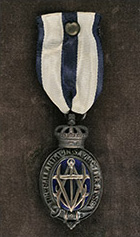Albert Medals underline heroism, horror of 1917 Halifax Explosion
August 21, 2014
It was December 6, 1917, at the height of the First World War. The Mont Blanc, loaded with military explosives, was en route from New York to France. The ship was entering Halifax Harbour to join a transatlantic convoy when it collided with a second freighter, the Imo. Within minutes, flames from the Mont Blanc were reaching 100 metres into the morning sky and the crew had abandoned ship.
The Canadian naval ship HMCS Niobe immediately dispatched its small steamboat to the flaming vessel, “to see what could be done.” Seven men volunteered to crew the boat, although they were “fully aware of the desperate nature” of their mission, according to the official account. These British responders rowed into danger aboard a whaling ship sent from HMS Highflyer. When the whaler arrived at the scene, its commanding officer concluded that the Mont Blanc could not be saved. He directed the oarsmen to pull instead toward the Imo, in the hope of securing a line for a nearby tug, which might tow the ship to safety.
As the whaler approached the Imo and the steamboat drew alongside the Mont Blanc, the explosives detonated. It was the largest man-made blast in history, prior to the 1945 detonation of the atomic bomb. All aboard the Canadian steamboat perished, as did all but one of the whaler’s crew. The blast laid waste much of Halifax, killing an estimated 2,000 people and injuring another 9,000.
For their willingness to risk their own lives “in the endeavour to save the lives of others,” two of the Canadians — Acting Coxswain Albert Charles Mattison (RCN) and Stoker Petty Officer Edmund Ernest Beard (RNCVR) — were posthumously awarded the Albert Medal for Saving Life at Sea, conferred by the King. The lone survivor from the British whaler, Able Seaman William Becker, was honoured in the same way. The whaler’s officer in charge, Lieutenant-Commander Tom Kenneth Triggs, received the higher-ranking Albert Medal in Gold for Saving Life at Sea.
In total, six Albert Medals were awarded for actions on that day in Halifax. Remarkably, all four medals described above are now held by the Canadian War Museum. The Beard medal was the most recently acquired (in April 2014). Another two Albert Medals were awarded to British navy personnel for their role in a heroic act that took place after the explosion.
The Albert Medals awarded to the Canadians are powerful symbols of Canada’s then-nascent navy, the service and sacrifice of its members and the First World War’s impact on Canada and its people. But, most of all, both the Canadian and British medals testify to the daring and devastation witnessed in Halifax Harbour on that historic morning in 1917.
[Image: Albert Medal for Saving Life at Sea awarded to Edmund Ernest Beard, CWM20130162-001, Tilston Memorial Collection of Canadian Military Medals, ©Canadian War Museum]